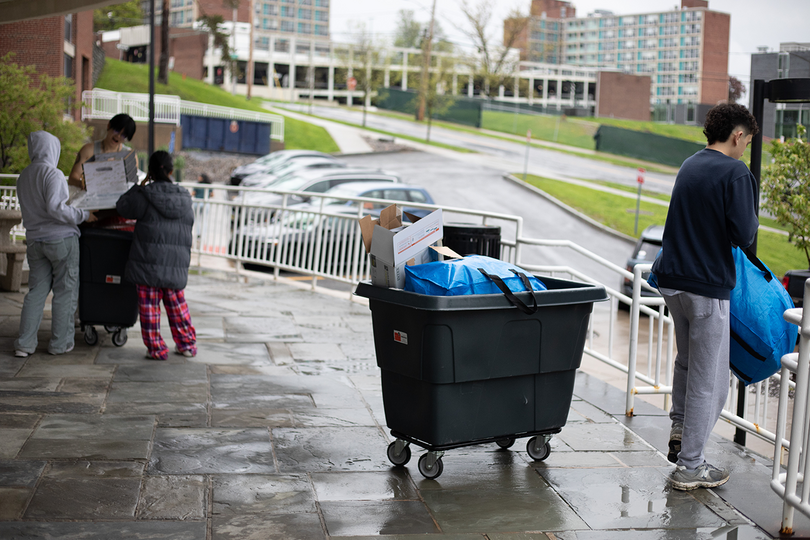Opinion: Move-out shows SU student consumerism, need for mindful purchasing

The student culture of disposability and wastefulness at Syracuse University appears affluently disconnected. We must limit unnecessary consumption, keeping landfill overflow and our environment in mind for future generations. Leonardo Eriman | Photo Editor
Get the latest Syracuse news delivered right to your inbox.
Subscribe to our newsletter here.
As my roommate and I wandered around Day Hall during our last few weeks on campus, we noticed the mountains of furniture and trash piled up in the hallways. I was shocked by the things people were dumping as they packed up to move out. At one point, I even saw a brand-new, untouched North Face jacket in the trash. I’ve seen Ugg shoes in great condition, boxes of makeup, furniture with almost no faults and cartons of unopened food.
And this epidemic isn’t exclusive to Syracuse University. PlanetAid estimates a single college student wastes about 640 pounds of trash a year, with more than one-third of this waste occurring between May and June.
As the year comes to an end, students are getting rid of what they don’t like or have no room for. They don’t care about where it ends up, let alone entertain thoughts of repurposing. Instead of giving perfectly good items a second life, students see everything as disposable because most of us feel untouched by the consequences of leaving everything for the landfill.
In the United States, 9.6 million tons of furniture end up in the landfill every year. This problem isn’t a matter of quality, though: it’s a matter of laziness and indifference.
When you grow up in a privileged position of knowing you can always repurchase something, even minor flaws trigger discard rather than an attempt to mend or even donate.
College students are incredibly susceptible to microtrends, buying cheap, fast-fashion products to keep up with the latest obsession. When these don’t feel popular anymore, they get tossed aside.
College students are constantly being sold the idea of what their four-year experience should look like. A big part of that includes clothes worn once and dorm rooms decorated to the brim with belongings they’ll get rid of in May. Affluence is prominent on college campuses, and it’s upsetting to see expensive items tossed like garbage when some people don’t even know if they can afford half of their school year necessities.

Sophia Burke | Digital Design Director
When you’re surrounded by wealth at one of the most expensive colleges in the country, you forget it’s not normal to be throwing things away left and right just because it doesn’t suit your needs anymore.
Students need to realize that all the things they stock up on and then dump actually go somewhere. Just because they’ve deemed it disposable doesn’t mean it is. If we don’t change our materialistic attitudes and spending habits, the environment will eventually be unable to support them.
SU itself promotes end-of-year clothing and food drives, but the luxury appliances left behind aren’t realistically what charity organizations look for. Fridges, microwaves, Target brand ottomans and vanity mirrors aren’t of much service to those disadvantaged.
There are other solutions to fix this on SU’s campus, though, and maybe this initiative will inspire national consumption awareness to alleviate that huge waste statistic.
Hendricks Chapel’s food pantry collects unopened food, just like the three packages of 50 unopened Ramen noodles I saw placed on top of the trash bins. Furniture can be sold or passed around in Buy Nothing groups. Bird Library has an area to leave books behind, and old clothes can be donated or sold. Furthermore, when you go to Target or Ikea to buy shelves or mirrors for a social media-worthy dorm room, think for a second about what you’re going to do with those items at the end of the year.
There aren’t always going to be food and clothing drives available and students won’t always be able to spend time listing items for sale. Therefore, we must be preemptively conscious. Many of us are very privileged to be able to buy things without a second thought, something that isn’t a reality for many. But this means we must put our spending abilities to good use.
Don’t buy something you can’t see yourself fitting into your car at the end of the year. Stop purchasing clothes you only see being worn at one event. Be mindful of your purchases because they make an impact, whether you see it or not.
Helena Sauriat is a freshman majoring in anthropology. She can be reached at hrsauria@syr.edu.






